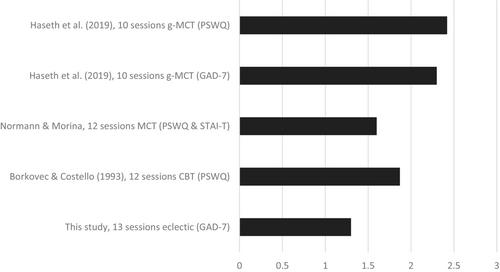Manual-based treatments, such as cognitive behavioural therapy and metacognitive therapy, are effective for patients with generalised anxiety disorder (GAD), but no studies have examined non-manualised clinically representative treatment for GAD.
The sample consisted of 103 patients with GAD who completed non-manualised eclectic outpatient treatment at a local psychiatric outpatient clinic from 2020 to 2023. Questionnaires before and after treatment measured GAD symptoms, depressive symptoms, functioning, health and treatment satisfaction.
There were significant improvements with large effect sizes (Cohen's d using pooled standard deviations) for GAD symptoms (d = 1.30, p < .001), depressive symptoms (d = 1.22, p < .001) and functioning (d = 0.87, p < .001). There was a medium improvement in health (d = −0.66, p < .001). Regarding GAD symptoms, half of the sample achieved clinically significant change (scoring below cut-off at post-treatment and achieving reliable improvement), and 69% showed reliable improvement (statistically significant change). Most patients (72%–84%) were satisfied with their treatment.
Clinically representative treatment is associated with improvement in GAD, but the effect sizes were smaller than in manual-based treatments. Research using randomised controlled trial designs comparing manual-based treatment to clinically representative treatment is needed to establish relative efficacy and for refining treatment guidelines in Norway.



